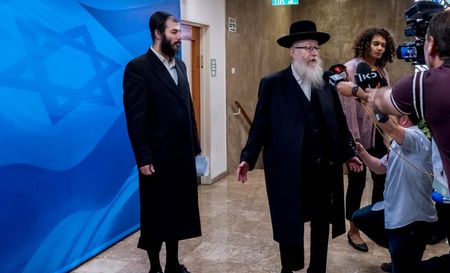TEL AVIV (Reuters) – Israeli ministers on Thursday averted a health care crisis by passing a last-minute allocation of 500 million shekels ($143 million) to pay for new lifesaving medicines for thousands of patients.
Israel is without a permanent government and has no state budget for 2020, meaning its ministries by law revert to the previous year’s budget with no new spending.
Thousands of patients suffering from all sorts of diseases feared this meant no money to cover new drugs or medical technologies that they hope will save or improve their lives.
“This is important news for those who are sick and for the health system,” said Deputy Health Minister Yaakov Litzman after the health and finance ministries came up with the money.
He did not say where the funds came from.
The Israeli economy has so far weathered two inconclusive ballots and a year of successive caretaker governments, but the automatic spending freezes will weigh on economic growth as well as social services.
Freezing spending on the country’s subsidized “drug basket” would have been a political disaster.
On Dec. 11 patient groups pleaded with lawmakers to budget extra funds before an end-of-year deadline.
“It’s not logical that the (political) situation in the country endangers my children’s ability to see,” said Aharon Kabesa, a father of two children suffering from a rare retinal disease that leads to blindness.
The drug he hopes will be included in the basket has a one-time cost of $850,000.
Israel’s annual health budget stands at around 54 billion shekels. Once a year patients, doctors and pharmaceutical companies ask that hundreds of new treatments enter the basket. A Health Ministry committee assesses and chooses some of them, examining things like efficacy, frequency and cost.
The unique system is rigid in its timeline but flexible in its judgments, which has led to relatively broad universal drug coverage.
Israel will hold another general election on March 2.
(Reporting by Tova Cohen and Ari Rabinovitch; Editing by Alexandra Hudson)


